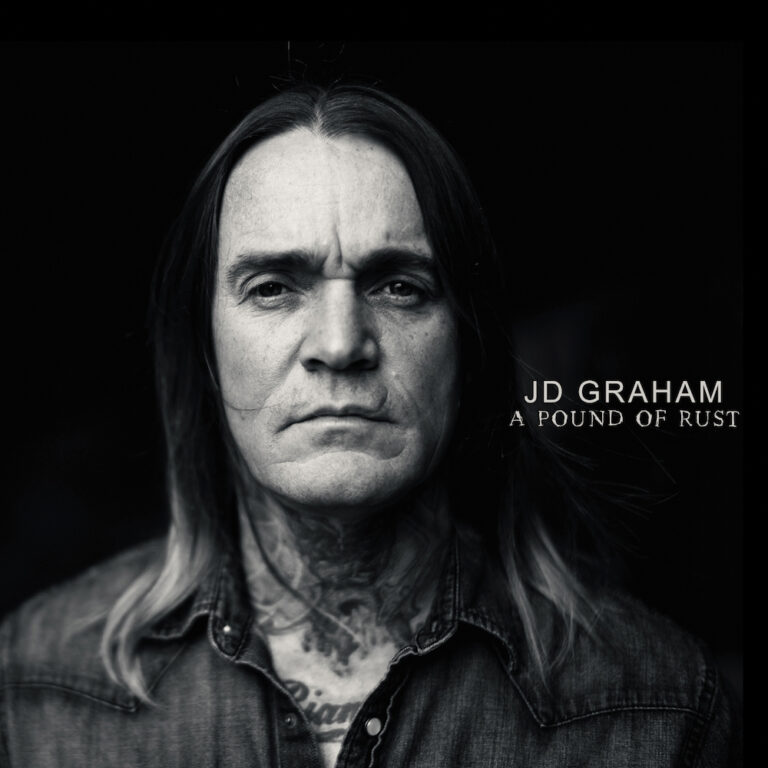
By Brian Rock
JD Graham’s A Pound Of Rust is an brutally honest and unflinchingly personal story of addiction and redemption. In fact, listening to this album feels like eavesdropping on a tragic, and long overdue confession. After wrestling with drug addiction for twenty years, fate finally caught up to Graham in the form of a prison sentence. About the experience, he says, “I knew I would meet my demons in prison and that one of us would die.” Thankfully it was the demons who were slayed in that dim, solitary cell. But the damage they’ve done lives on in his memories and in these songs.
The title song starts with Graham stating, “I’ve got some things to get off my chest.” His single acoustic guitar accompanies his resonant baritone voice as he opens up about his addiction, his self-doubt, and his struggle to make amends for his past. As he poetically reveals, “Shedding all this old skin is hard. And I feel naked now, because the world can see my scars.” No matter how unpleasant, the past does not like to be buried and will do its best to pull us back into it. Graham confronts this, singing, “My whole life’s been a battleground, and I still don’t know if I can turn this pound of rust into a pound of gold.” Recounting his past struggles and brushes with death, he commits to the mantra of “Get knocked down 99 times, get up 100.” Without flinching, without trying to pass the blame, Graham confronts the damage of his past and bravely soldiers on.
“Letter From My Conscience,” is a harsh self-critique from his newly found, sober state of consciousness. Graham’s loss of freedom in prison finally allowed his conscience to be freed. Haunting him like a ghost of Christmas past, his conscience reminds him, “You loved the storm and you couldn’t stay still, And, man I tried to calm you down, but there was no stopping your spinning wheels.” And like a more somber “Mama tried,” his conscience continues, “You figured out soon how to get just what you want. Oh, you’d kick and scream, but even daddy’s belt couldn’t change the road you’re on.” In its most damning critique, his conscience reminds him, “I threw you a rope and watched you chew it into threads.”
Adding some muted steel guitar to his lone acoustic on “Runnin’ Through Me,” Graham recounts his first false steps into drug use before he even turned 13. The semi-autobiographical, “Sidewalk Bobby” is a riches to rags story of a man who loses everything to his addiction. “Quiet In My Cloud,” is a reflection on his previous state of denial. Even though all the signs point to impending disaster, he stubbornly claims, “It’s quiet in my cloud. Stay the hell out. I ain’t never coming down.” The addition of drums, electric bass, and steel guitar give this song an almost giddy feel in contrast to the surrounding confessionals. The tone perfectly evokes the fleeting periods of euphoria that dot the path to drug-induced destruction.
But of course, no matter how much he denies the effects of his addiction, the results continue to manifest themselves, most notably in his relationships. “2 Days South of December,” “Adaline,” “West Virginia,” “Part Time Lovin’,” and “Her Memory” all detail the devastating toll that drugs take on relationships. Some were left behind, some were driven away, and one was carted away. Graham reflects on his role in them all. Continuing his reflections on “Growin’ Old,” he notes, “The rear view’s 20/20 as I gaze upon my youth. I wish someone would’ve told me I was running from the truth.” Finally realizing that drugs don’t change reality, they only postpone it – and make it worse; he accepts the task of facing life sober. He admits his mistakes and puts his faith in a higher power. His struggles have given him both insight and compassion for those facing the same demons he once did. He observes, “Drugs are getting cheaper and the price of gas is high. The prisons and the bars are full of men who’ve lost their minds.” Having been through Hell himself, perhaps he can offer advice or at least comfort in song. Stepping back for a look at the bigger picture on, ‘Stories From The Grave,” Graham pays tribute to al the nameless men and women who came before us and struggled in anonymity to make their lives better; and in doing so may have made our lives better today.
Powerful, intense, and visceral, “A Pound Of Rust,” is more confessional than Merle Haggard’s “I’m a Lonesome Fugitive.” It’s more accusatory than Dylan’s “The Times They Are A Changin’.” But his condemnation is directed at himself rather than society at large. If all the people who wanted to change the world by changing others would follow Graham’s lead and work on changing themselves, the world would already be a better place. But no matter how painful, JD Graham proves change is possible for even the most astray.
thejdgraham.com | fb | buy
Brian Rock
Latest posts by Brian Rock (see all)
- Yarn’s Born, Blessed, Grateful and Alive - July 26, 2024
- Rainy Eyes Lonesome Highway - July 16, 2024
- Jenny Don’t and The Spurs Broken Hearted Blue - June 18, 2024


